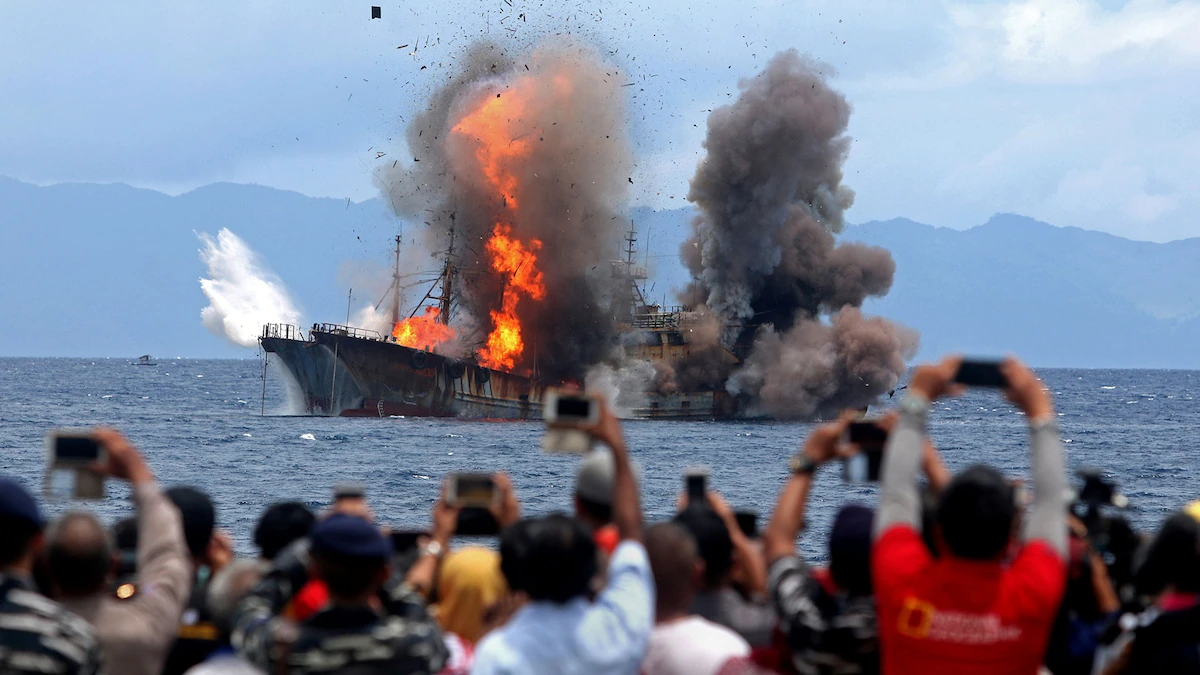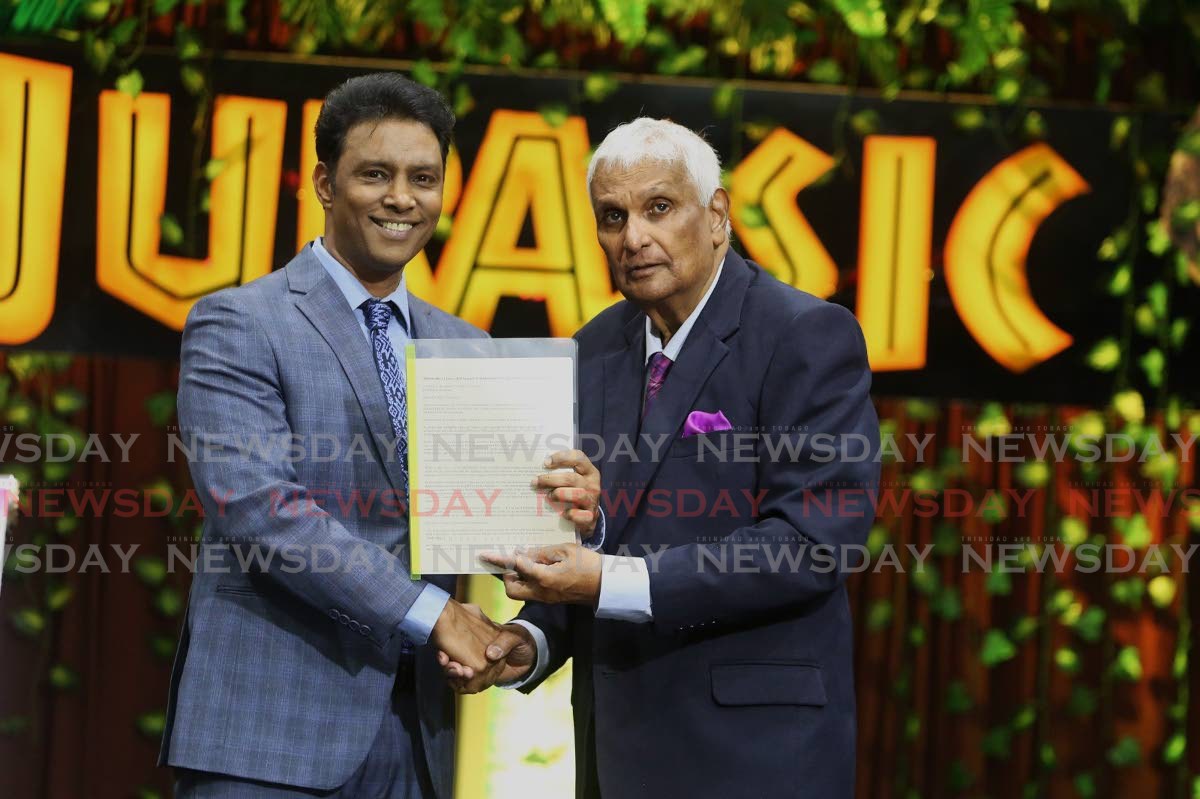Copyright National Geographic

In the rough waves of the South Atlantic in February 2016, an Argentine coast guard ship approached a squid-jigging vessel illegally fishing inside the nation’s territorial waters. As the Argentines approached, the boat winched its equipment aboard and quickly fled north. The Argentines ordered the boat to stop and then fired a warning shot, but it escaped across the watery border with Uruguay and headed into international waters. Before it disappeared, the coast guard took note of the ship’s name and flag of registration: the Hua Li 8 of China. Across the Atlantic, at Interpol’s headquarters in Lyon, France, Alistair McDonnell had already heard about the incident before Argentina formally requested his help. At the time, McDonnell, a graying Brit of Irish descent, was with Interpol’s Global Fisheries Enforcement team (FET), a unit tasked with investigating illegal fishing. When the call for help came, he knew exactly what to do. His team had done it many times before. The FET issued an Interpol Purple Notice, requesting information on the Hua Li 8 from regional law enforcement, port directors, ships at sea, or anywhere else the suspicious vessel might be seen. For months, McDonnell and his team tracked the Hua Li 8 around the clock, piecing together information on its location using satellite images and reports from passing ships. On the weekends and after hours, the team worked out of a café near McDonnell’s apartment, where they fueled up with thimbles of strong black espresso. “I would go do my shopping, come back, and they’d be there,” he reminisces. “I was just saying, ‘Crack on, boys!’” For most of that time, the Hua Li 8 went dark, turning off its automatic identification system to better disguise its location, McDonnell says. Still, the team was undeterred and, when modern tracking methods proved fruitless, they turned to dead reckoning, a traditional mariner technique, to find the ship. Using the ship’s last known speed and direction, along with vessel size, fuel capacity, wind and wave direction, the analysts tried to divine where a 223-foot ship might be in thousands of miles of open water. At one point, they believed the Hua Li 8 was in the Indian Ocean. “We figured out it was heading for the [the Strait of Malacca] off Indonesia,” says McDonnell, who then asked a friendly nation to get eyes on the ship. It was “a big ask.” But it paid off when the nation’s patrol ship sent back photos of the Hua Li 8 along with its precise coordinates. Their dead reckoning worked. National Geographic History Magazine The gift that brings the past to life - now with a free tote McDonnell’s team coordinated with Indonesia, which sent its navy to intercept the Hua Li 8 as it passed through the country’s territorial waters and hauled it back to port. He’s fond of the Hua Li 8 case because it was a quick turnaround with a satisfying ending. Sometimes the team would follow a ship for years before finally catching it. Plus, it highlighted one of the FET’s greatest strengths: its unique ability to run an international investigation by working with different countries in the pursuit of one rogue ship. The Hua Li 8 was captured by Indonesia, blacklisted from Argentine waters, fined $175,800, and sanctioned by China. An Indonesian Navy spokesman said the boat was allegedly involved in human trafficking and slavery. The FET’s expertise in tracking ships became known both inside and outside of Interpol. The team was behind the biggest cases of international illegal, unreported, and unregulated fishing—known as IUU fishing—in the world. “All of a sudden you’re winning,” McDonnell says. “All of a sudden we’re in demand.” The FET's fight against illegal fishing McDonnell and the other original members of the unit all left as outside funding from the Pew Charitable Trusts and the Norwegian government dried up. Several sources within the coalition of nonprofits that fight illegal fishing haven’t heard from Interpol at all lately, a change from past practices that threatens to degrade Interpol’s intelligence gathering and reach in this area. “Interpol might have someone at a desk somewhere,” says Bradley Soule, an American who was a member of the FET before co-founding OceanMind, a fishing intelligence company. But he adds, to his knowledge, the FET “doesn’t exist anymore.” Per Erik Bergh, who works with Stop Illegal Fishing, a nonprofit combatting illegal fishing across Africa, says he hasn’t heard anything from Interpol in a while. “I spoke to [McDonnell] quite frequently,” he says. “I don’t know what they’re doing on fisheries. I guess that says it all.” McDonnell indicated as much on LinkedIn when he wrote: “Sadly the Interpol Global Fisheries Enforcement team ... has been disbanded.” Thomas Ungerbuehler, assistant director of environmental security at Interpol, said via email that fisheries investigations continue but conceded that outside funding for wildlife crimes comes in cycles, so personnel and activities are “not uniform over time.” He acknowledged the position of senior officer to lead fisheries investigations is vacant. Nonetheless, he wrote, without offering specifics, that Interpol’s environmental security team aided 15 member countries investigating fisheries crimes in 2024. In January 2025, Interpol announced almost six million dollars in funding from the German International Climate Initiative to prevent environmental crimes, including within fisheries. Illegal fishing, he said, “remains a significant priority.” It’s unclear how a smaller FET will impact the global fight against illegal fishing, but what is clear is that for a few brief shining years, the team helped galvanize nations to fight back against poachers threatening the health of the world’s oceans. Nations across the world are trying to preserve and sustain fish stocks amid threats posed by overfishing and climate change. But seafood consumption has boomed, driven by global population growth. That demand has pushed some fish stocks to the brink of extinction. Bluefin tuna in the Northeast Atlantic and Pacific in the last few years, cod off Canada in the 1990s, and Northeast Atlantic herring in the 1980s have all required emergency intervention to save them from disappearing. To protect fish, and the profits and livelihoods they support, countries establish regional fishery treaties to protect vulnerable species. Illegal fishing threatens that system. The FET was a kind of eye in the sky that watched over the world’s oceans. The problem is endless, but there were results, like helping drive poachers out of the Southern Ocean and giving pirates the impression that there was nowhere to hide. Forming a team of international police The idea for a team of international police dedicated to fighting illegal fishing was born on a sunny day in 2010, at a hotel in the Virginia countryside, when the Pew Charitable Trusts convened a retreat to tackle IUU fishing. Officials from the United States, the United Kingdom, Norway, Interpol, Pew, and other organizations attended. The conference was prompted by increasing evidence of how quickly the oceans were being overfished. A 2009 paper in the scientific journal PLOS One estimated that between 11 million and 26 million tons of fish were caught illegally, costing $10 to $23 billion annually, from an estimated $195 billion trade in aquatic products. This was on top of a disheartening trend in the United Nations’ reports on the global fishing industry, which showed the annual catch leveling off starting in the 1990s, even as human consumption increased. Farmed fish helped meet some of the demand, but boats were fishing more from a dwindling supply. The consensus from the conference was to focus on increased regulation, according to Tony Long, who was not in attendance but was hired to run the Pew Charitable Trust’s global campaign to end illegal fishing in its aftermath. This included more cooperation among states that were part of regional fishery management organizations; stronger port state controls, which empowered authorities to board vessels suspected of holding illegal catch; and a unit at Interpol to facilitate investigations and information sharing among nations. Pew and the Norwegian Agency for Development Cooperation agreed to fund the unit. The experiment was dubbed Project Scale. (Wildlife crimes and human rights abuses plague Taiwanese fishing vessels, crews say.) Treating illegal fishing like organized crime McDonnell came to fisheries enforcement in a roundabout way. He attended Oxford University, where his family hoped he would go into law. McDonnell felt differently: “I just couldn’t do it,” he says. He dropped out of Oxford but eventually went back to university for a fisheries degree. It was the 1980s, and in school he studied the possibility of complete pelagic collapse, the catastrophic decline of a fish population, in several fisheries sectors. Since then, he’s seen how management and enforcement can be successful. Management plans are credited with significantly reducing overfishing in the Northeast Atlantic, for instance. He eventually worked his way up to work on IUU fishing at the U.K.’s Marine Management Organisation. After the Virginia conference, which McDonnell attended, he lobbied for the Interpol job. Project Scale launched in 2013 with Soule; McDonnell joined a year later along with Mario Alcaide, a former Portuguese maritime police officer. The team was small but crafty. They couldn’t make arrests, board ships, or demand documents; they existed solely to help nations run investigations. But what they did have was a fancy name they could leverage to get assistance from nonprofits, environmental groups, and countries whose economies were hurt by IUU fishing. Their first job was to make sure countries knew how to contact them. Officially, a member country must reach out to Interpol for help first, through a law enforcement portal known as the National Central Bureau (NCB). Unofficially, the FET would hear about an incident and use back channels. They were also energetic about using untraditional methods to help gather information and intelligence. McDonnell, for example, used surrogates to contact the Argentines first about the Hua Li 8 and encourage them to ask for Interpol’s help. He spoke regularly with nonprofits to see what intelligence could be gathered. McDonnell likes to say the real innovation at the FET was to investigate and treat illegal fishing like organized crime. They would follow the networks and money through all the different crimes that might occur—like trafficking in drugs, contraband, and humans—and get different agencies to investigate, not just fisheries officers. And they would often go after bureaucratic, but still punishable, crimes like document fraud. “We called the strategy death by a thousand cuts,” he says. From hunting down poachers to going quiet Within a year of joining the fisheries team, McDonnell and his colleagues engaged in a major investigation when Sea Shepherd Global, a direct-action nonprofit dedicated to protecting marine wildlife, launched a campaign against toothfish poachers in Antarctica at the end of 2014. A fleet of largely Spanish-owned vessels, known as the Bandit 6, had been flagrantly poaching toothfish in Antarctic waters for years. Toothfish, a fish that looks exactly like its name, is marketed as the more palatable-sounding Chilean sea bass and sells for a premium. But it is vulnerable to overfishing because it is slow to mature and reproduce. The region isn’t part of any one country, so enforcement is complicated. Fed up with the inaction, two Sea Shepherd ships sailed down to confront the poachers head-on. McDonnell and Alcaide wanted in on the action. The problem for the team was that Interpol had issued a Red Notice from Japan and Costa Rica seeking the detention and extradition of Sea Shepherd’s controversial founder, Paul Watson, over his prior confrontation with shark fishers and whalers. (A Costa Rican judge eventually dismissed charges against Watson, and Watson has since been removed from Red Notice from Japan.) In any case, Watson wasn’t in the Antarctic at the time. Still, “we weren’t allowed to work with Sea Shepherd directly,” McDonnell recalls. Project Scale “was able to convince the higher-ups at Interpol that they could take information from us if they treated it as if it was coming from a confidential informant,” says Peter Hammarstedt, the Sea Shepherd captain who chased the Thunder, one of the Bandit 6 ships. He recalls the relationship being “one-sided.” There was “no feedback or communication in return. I understood the realpolitik of it all.” Interpol declined to comment. Hammarstedt’s chase lasted 110 days, until the Thunder’s captain scuttled his ship attempting to hide evidence of illegal fishing. It didn’t work. Interpol and Spanish authorities raided Galician properties to collect documents linking the owner to the ship. The captain and two crew members were convicted in São Tomé and Príncipe, where the ship sank; the captain was sentenced to three years in prison. They were also fined more than $17 million; the owner of the ship was fined nearly $10 million. “I don’t think that conviction would have happened had it not been for Interpol,” Hammarstedt says. By mid-2016 the last of the Bandit 6 ships had been captured, the owners fined, and the fleet shut down. Almost immediately, the fisheries team began tracking another toothfish poacher, this one from Russia, as it fled Namibia after trying to unload 125 tons of toothfish. The 175-foot ship frequently changed names and flags and disguised its automatic identification system. It escaped detention in at least two ports. Interpol, with the help of OceanMind, was able to keep track of the ship as it escaped. Still, it took Interpol and nearly a dozen nations and NGOs two years to finally hunt down the ship, whose final name was the STS-50. After it was caught, again by the Indonesians Navy, the Russian owners abandoned the ship and its crew, and because they used fraudulent registration papers, they couldn’t be tracked down. The captain was jailed for four months and fined over $12,000, and the ship was confiscated. Meanwhile, Argentina was still chasing Chinese poachers out of its waters. Liberia, Gabon, and other African nations were reporting illegal incursions by foreign fishing fleets. The work, it seemed, was never ending. But not the money. Pew and Norway’s funding ended after nearly a decade. “The vision was always that would have to be the case,” says Peter Horn, a project director for the International Fisheries team at the Pew Charitable Trusts. “We had a short window we were going to fund them for.” It had started out as Project Scale, an experiment to meet a crisis, that continued because it was successful. No one had planned for it to continue in perpetuity. But Pew and the Norwegian government had always hoped other countries would join in support, he says. The news was shocking to those invested in this battle. “The Interpol system is needed,” says Long, who left Pew to run Global Fishing Watch, which uses data and visualization tools to track fishing. "We were alarmed when the team said, That’s it, we’re scaling down our activities,” Pew’s Horn said in 2024. But, he says, “It hasn’t been dissolved. Just this year it started to become active again.” They might be active again, but they are very quiet about it. “To me it appears that Interpol has more or less left the scene, but I may be wrong,” Bergh, with the African coalition Stop Illegal Fishing, wrote in an email. He suspects Interpol changed its approach and is less forthcoming with groups that are not law enforcement. “They changed their routines, and Purple Notices or IUU alerts are only sent to the [National Central Bureau].”



